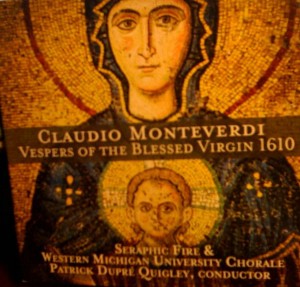
Seraphic Fire’s Monteverdi Disc Raises SoFla Cultural Profile
Over the years, the Seraphic Fire concert choir has released a number of recordings, all of them captured during live performances and later transferred to discs. There also are insta-CD recordings of its concerts available by e-mail, as they were the weekend of the 17th for a program of sacred motets by Couperin and Clérambault.
But earlier this year, the choir released its recording of the Vespers of the Blessed Virgin, published 400 years ago this year by the great Italian composer Claudio Monteverdi. This recording features the Western Michigan University Chorale along with Seraphic Fire, the forces that presented this music in mid-May as a celebration of the anniversary of the appearance of this piece in print.
I’ve been listening to this disc for the past couple days, and it’s impressive. Part of that comes from the professionalism that was brought to this record, which gives the performance a weight that sometimes is hard to achieve in live recordings. The other key thing is that this music is presented with tiny instrumental forces to accompany the larger singing cohort of 54 voices: a chamber organ, theorbo, lute, and violone.
I like this approach – much as I enjoy the Paul McCreesh one-voice-on-a-part version of Bach’s St. Matthew Passion – because it allows the listener to really hear the music for what it is at its heart, without the big brass complement that usually accompanies it. Director Patrick Dupré Quigley argues in his notes to the disc that Monteverdi offers the performers the option of leaving out the cornetti parts because he intended that this music be presented intimately.
What we gain by this approach is a certain freshness and novelty of sound that’s very attractive. In the Pulchra es (Thou art beautiful, my love, sweet and comely daughter of Jerusalem), for instance, singers Abigail Hayes Lennox and Kathryn Mueller, accompanied only by a lute, sound like they’re singing a new madrigal, just off the stocks. And it’s easy to hear the parallels with the kind of writing that Monteverdi had already been doing for the opera house: Vivid, changeable, psychologically penetrating when the words require it.
The ninth season of Seraphic Fire, which will include the St. John Passion of Bach as well as Henry Purcell’s King Arthur, moves the group further in the direction of making distinct versions of large masterworks. In the earlier days, Seraphic Fire concerts had a great variety of small pieces grouped around a theme, in the manner of groups such as Chanticleer or the King’s Singers. But now it’s more akin to something like McCreesh’s Gabrieli Consort or Harry Christopher’s The Sixteen, in which a director with firm ideas about how to interpret major repertory brings his own vision to these works and makes a statement.
That’s why this Monteverdi disc is potentially so important for what it says about South Florida’s classical music culture: that this part of the country has been able to enthusiastically support an intensely serious musical endeavor that marries scrupulous scholarship with sheer sonic goodness. Give it a listen. It’s a good reading of this classic of 17th-century music, and at the same time it raises our cultural profile.
Recent Content
-
Artsarticle ·
-
Artsarticle ·
-
Artsarticle ·

